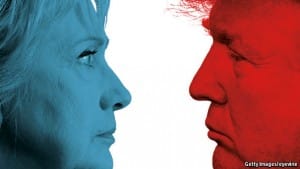
The primaries in USA: Battle lines
 HILLARY CLINTON will be the Democratic nominee; the man most likely to face her in November on the Republican ticket is Donald Trump.
HILLARY CLINTON will be the Democratic nominee; the man most likely to face her in November on the Republican ticket is Donald Trump.
Those are the battle lines after the primaries on Super Tuesday. In many ways this is profoundly gloomy. Mr Trump has said ever more repellent things about immigrants, women and Muslims and declined to condemn white supremacists. But he changes his sales pitch as easily as his socks: in a speech after winning seven out of 11 states, he stopped snarling and tried to sound presidential. It would be unwise to underestimate his ability to feign gravitas and transform himself into an apparent centrist.
The only obstacle between Mr Trump and the Oval Office would be Mrs Clinton. She is a formidable and in some ways admirable candidate, but flawed. She is unloved by bits of her party’s base and subject to an investigation into whether she mishandled classified information.
Small wonder that so many who contemplate American politics today sink into despair. But with a large dose of optimism and continued faith in the good sense of American voters, it is just possible to see November’s election in a more positive light. The vote for the presidency could yet yield the reshaping of the two main parties and a political realignment that leads to a less stagnant and gridlocked government.
Be nice now
This optimistic scenario depends on converting today’s antagonism into a force for change. The primaries have made clear that a large share of American voters are angry: angry with their own side’s representatives, angry with their opponents and angry with the world.
So far, that anger has been channelled into divisiveness. On the right, Mr Trump has exploited the discontent by insulting his way to the front of the pack, stirring up racial resentment as he goes, delighting crowds with a list of proposals that run from the unethical to the unworkable. On parts of the left, the rage is more polite but, particularly where it is aimed at Wall Street, no less deeply felt.
In recent elections partisan fissures have been reinforced by the brutal maths of voter turnout. Polling shows that a majority of Republicans and Democrats believe that the other lot are so depraved as to pose a threat to the nation itself. Because it is hard to persuade people who think like this to switch sides, electoral strategists argue that chasing swing voters is pointless. The easiest extra votes come from the 40% of the electorate who typically stay at home in a presidential poll. Each side therefore concentrates on stirring up people who support it but might not vote. That raises the anger to a new pitch.
If this desperate logic is repeated in a Clinton v Trump race, the contest could have consequences both ugly and far-reaching, particularly for the Republicans. After winning a race fuelled by anger and led by Mr Trump, the party would almost certainly ditch its attachment to free trade and a muscular foreign policy and retreat into isolationism, xenophobia and economic populism. If it survived that shift (a big if), it would by the middle of the century be a white-nationalist party in a country that will be majority non-white. More likely, it would fracture, parts of the Republican coalition spinning off to find a new home elsewhere.
For Mrs Clinton, going down the angry route might not split the party, but would almost certainly result in defeat. Democrats tend to fare poorly when their anguish overflows and begins to sound like contempt for America. It is hard to imagine Mrs Clinton credibly playing the political insurgent. She has decades of experience when the angriest voters want a novice. Nobody can out-hate Mr Trump. So it is encouraging that Mrs Clinton celebrated her victories on Super Tuesday by calling for more “love and kindness” in politics.
The opportunity for a better outcome lies in the asymmetry of the risks. Mrs Clinton has the opportunity to put together a coalition of anti-Trump voters broader than the one that carried Barack Obama to victory in 2008 and 2012. Despair over Mr Trump has reached such an intensity among some Republicans that the usual rules about there being no swing voters may no longer apply. If Mrs Clinton were to combine a high turnout on her own side with a sizeable number of Republican abstentions and spoilt ballots and some voters who are prepared to switch from red to blue, then Democrats could not just win the presidency with a landslide, but also wrest back control of the Senate.
To form this coalition for stopping the blond Berlusconi, Mrs Clinton would have to woo moderate, business-minded Republicans, and such folk would in turn have to put the national interest ahead of their tribe’s victory in November. Republicans like to talk about the importance of character; Mr Trump offers a chance to show that means something. Mr Trump often insults other Republicans; they owe him no loyalty. Some prominent Republicans have already begun to attack him, including Mitt Romney, the party’s nominee in 2012. More will have to make that move.
Don’t throw it away
After the election a broad coalition could melt away as fast as it had formed. Democrats could use their advantage to force through what they can without the support of their opponents while they have the chance. They would then be punished in subsequent elections and the federal government would return to its familiar divided self: unable to pass budgets, trim spending on entitlements or find money to repair roads.
Or a President Hillary Clinton might argue for the virtues of democratic compromise, and not claim that she can magically give her core voters everything they want all of the time. If she were able to pursue a different kind of politics, one that seeks to deal with some Republican concerns as well as Democratic ones, she might just hold the new consensus together for longer, reshaping the parties, making the country more governable and burying Mr Trump’s offer of an America turned against itself. This is the distant promise that 2016 holds. As the battle lines are drawn, try to bear it in mind.
